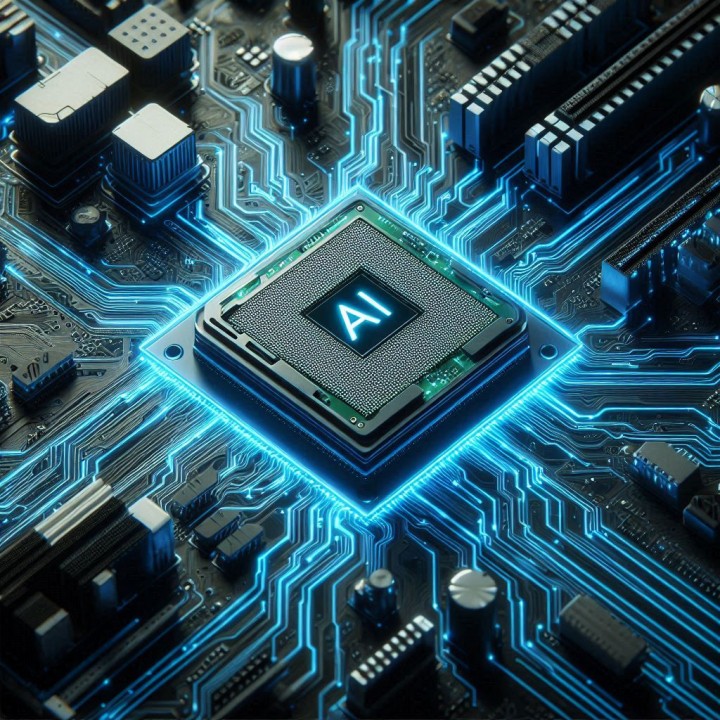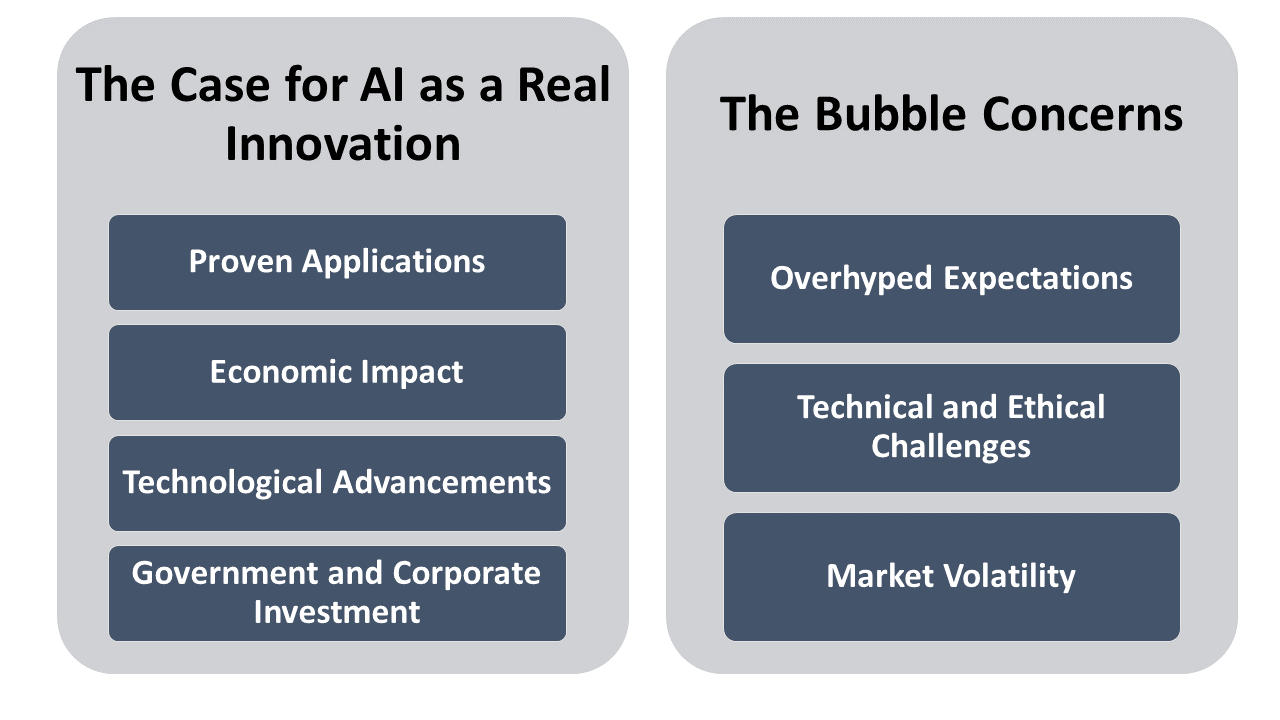Comments
- No comments found

Artificial Intelligence (AI) is transforming nearly every aspect of our lives, from autonomous vehicles to personalized online shopping experiences.
However, with the proliferation of AI comes a critical question: Is AI a revolutionary, enduring technology, or are we witnessing a bubble destined to burst? We will delve into both perspectives, examining the evidence and arguments for AI as a sustainable innovation versus the potential for an over-hyped market correction.

AI's transformative impact is evident in numerous fields. For instance, Google's DeepMind has developed algorithms capable of diagnosing eye diseases with over 90% accuracy, providing early detection and potentially saving millions of people from blindness.
In finance, AI systems are employed to detect fraudulent activities, manage risks, and optimize trading strategies. Companies like JPMorgan use AI algorithms to analyze vast datasets, identifying patterns that would be impossible for humans to discern. Similarly, AI-driven virtual assistants such as Apple's Siri and Amazon's Alexa have become integral parts of daily life, showcasing AI's capabilities in natural language processing and customer service.
The economic contributions of AI are substantial. According to a report by PwC, AI could contribute up to $15.7 trillion to the global economy by 2030, driven by productivity gains and increased consumer demand. In the United States alone, AI-related industries are expected to add approximately 97 million jobs by 2030, offsetting job losses in other sectors due to automation.
AI's potential to revolutionize industries is further underscored by its applications in sectors like manufacturing and logistics, where predictive maintenance and supply chain optimization can lead to significant cost savings and efficiency improvements.
The rapid advancements in machine learning, deep learning, and neural networks have significantly enhanced AI's capabilities. Techniques like reinforcement learning and transfer learning enable AI systems to learn from minimal data, adapt to new tasks, and improve over time. The development of powerful hardware, such as GPUs and specialized AI chips, has also accelerated the pace of innovation, allowing for more complex and computationally intensive models.
Furthermore, the availability of vast datasets and the growth of cloud computing have democratized access to AI technologies, enabling startups and small businesses to harness AI's potential.
Governments and corporations worldwide are investing heavily in AI research and development. The U.S. government has committed billions of dollars to AI initiatives, including funding for AI research institutes and collaborations with the private sector. Similarly, China has announced ambitious plans to become the global leader in AI by 2030, with significant investments in AI infrastructure and talent development.
Major tech companies like Google, Microsoft, and Amazon are also at the forefront of AI innovation, investing in cutting-edge research and acquiring AI startups to bolster their capabilities. These investments underscore the confidence in AI's long-term potential and the belief that it will continue to drive economic growth and technological progress.
Despite the undeniable advancements, there is a growing concern that AI may be over-hyped, with inflated expectations that could lead to disappointment. The media often portrays AI as an all-encompassing solution capable of solving any problem, which can lead to unrealistic expectations. The term "AI winter" refers to periods of reduced interest and funding for AI research, typically following periods of over-hyped expectations and subsequent disappointments.
Historical parallels can be drawn to the dot-com bubble of the late 1990s, where excessive speculation in internet-based companies led to a market collapse. Similar concerns are being raised about the current AI landscape, where startups with unproven technologies receive high valuations, and there is a rush to invest in AI without fully understanding its limitations.
AI systems, while powerful, are not without limitations. Issues such as bias in AI algorithms, lack of transparency, and difficulties in interpretability pose significant challenges. For example, facial recognition systems have been criticized for their inaccuracies and biases, particularly in identifying individuals from minority groups, leading to potential misuse and ethical concerns.
Additionally, the ethical implications of AI, such as job displacement due to automation and the potential for mass surveillance, raise important societal questions. As AI systems become more integrated into critical decision-making processes, ensuring fairness, accountability, and transparency becomes paramount.
The AI market is characterized by significant volatility. While some companies are making genuine strides in AI technology, others may be riding the wave of hype without substantial innovation. The risk of a market correction looms large if the financial returns do not match the inflated expectations.
Investors and companies may also face challenges in scaling AI solutions due to technical complexities, regulatory hurdles, and the need for specialized talent. This could lead to a re-evaluation of the market's true potential and a subsequent cooling of investment enthusiasm.
Despite concerns, the core technologies underpinning AI are likely to see sustained growth. Fields like reinforcement learning, quantum computing, and neuromorphic computing hold promise for future breakthroughs. The continued expansion of AI applications in healthcare, education, transportation, and beyond suggests a broadening scope for innovation.
AI's potential to address global challenges, such as climate change and public health, also underscores its importance. For example, AI can optimize energy consumption, model climate patterns, and accelerate the discovery of new drugs, demonstrating its capacity to contribute to societal well-being.
The role of regulation and governance in AI development cannot be understated. Governments and international organizations are beginning to establish frameworks to ensure the ethical and responsible use of AI. The European Union's General Data Protection Regulation (GDPR) and the proposed AI Act aim to set standards for AI transparency and accountability, serving as models for other regions.
Effective regulation can help mitigate the risks associated with AI, such as privacy violations and discrimination, while fostering innovation by providing clear guidelines for developers and companies.
As AI continues to evolve, industries and the workforce must adapt. Education and training programs are crucial for equipping individuals with the skills needed to thrive in an AI-driven economy. Governments and companies are investing in re-skilling and up-skilling initiatives to help workers transition to new roles and industries.
Moreover, fostering a culture of innovation and collaboration will be essential for navigating the challenges and opportunities presented by AI. Partnerships between academia, industry, and government can accelerate the development and deployment of AI technologies, ensuring they are aligned with societal needs and values.
In weighing the evidence, it becomes clear that AI is more than just a passing trend. While there are legitimate concerns about over-hyped expectations and market volatility, the technological advancements, proven applications, and substantial economic impact of AI suggest it is a real and transformative innovation. The potential risks associated with AI, including ethical challenges and market corrections, must be carefully managed through robust regulation and governance.
Ultimately, AI's future will depend on continued investment in research, a commitment to ethical practices, and a proactive approach to addressing its societal implications. As we navigate this complex landscape, a balanced perspective that recognizes both the potential and the pitfalls of AI will be crucial in ensuring its sustainable and beneficial development.
Ahmed Banafa is an expert in new tech with appearances on ABC, NBC , CBS, FOX TV and radio stations. He served as a professor, academic advisor and coordinator at well-known American universities and colleges. His researches are featured on Forbes, MIT Technology Review, ComputerWorld and Techonomy. He published over 100 articles about the internet of things, blockchain, artificial intelligence, cloud computing and big data. His research papers are used in many patents, numerous thesis and conferences. He is also a guest speaker at international technology conferences. He is the recipient of several awards, including Distinguished Tenured Staff Award, Instructor of the year and Certificate of Honor from the City and County of San Francisco. Ahmed studied cyber security at Harvard University. He is the author of the book: Secure and Smart Internet of Things Using Blockchain and AI.
Leave your comments
Post comment as a guest